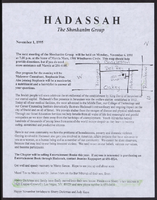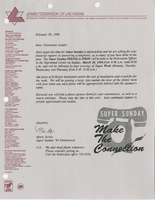Search the Special Collections and Archives Portal
Search Results
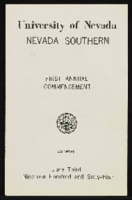
Nevada Southern University 1st commencement program
Date
1964-06-03
Archival Collection
Description
Commencement program from University of Nevada, Las Vegas Commencement Programs and Graduation Lists (UA-00115).
Text
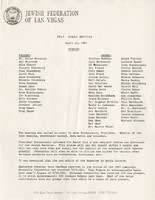
Jewish Federation correspondence, meeting minutes, and other records, item 07
Description
Board meeting minutes for the Jewish Federation of Las Vegas, Nevada, April 22, 1987.
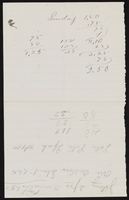
Stewart family banking records and receipts
Date
1904 to 1948
Archival Collection
Description
Stewart family banking records and receipts
Text
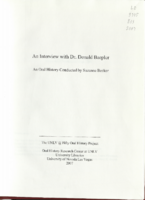
Transcript of interview with Dr. Donald Baepler by Suzanne Becker, April 23, 2007
Date
2007-04-23
Archival Collection
Description
Dr. Donald Baepler was born in Edmonton, Alberta, Canada in July of 1932. The family moved to Springfield, Illinois in 1936, where his father was president of Concordia Seminary. Donald decided at the age of seven that he wanted to pursue a Ph.D. in ornithology, not an unusual goal in his family. By the time he graduated high school, he knew that he wanted to attend Carlton College in Minnesota to study under Olin Sewall Pettingill. He followed world-famous ornithologist and artist George Sutton to Michigan and then to Oklahoma to complete his doctorate. In 1960, having completed his doctorate, Donald met with a recruiter from Las Vegas. It seemed like an intriguing place, so he took the interview and was offered a job on the spot. Instead, he took a job as professor of biology at Central Washington University, and within four years was vice president for administration and business. He had also been appointed to an accrediting team by the Northwest Association to accredit colleges in the western states, including Nevada Southern University in Las Vegas, and saw the growing town and university for the first time in 1965. Two years later, he was invited to take the job of Academic Vice President at SNU, which he accepted, and he and his family made the move to Las Vegas in 1968. Upon arriving in Las Vegas, Donald discovered that he had been named acting president because of Donald Moyer's abrupt resignation. He simply decided to do both jobs. He was successful in changing the name of the school to University of Nevada Las Vegas so that it would not be confused with a teacher's college. This was wholeheartedly accepted by the regents. Once Roman Zom was appointed president in 1969, Donald went back to the vice president position. In 1973, Dr. Baepler was appointed president of UNLV. He held that position for live years and then turned in his resignation. His intent was to teach, focus on a Museum of Natural History, and start a research center. Instead, he was offered the chancellorship of the university system, and he decided to accept the job By 1981, Donald was ready to return to teaching and research, so he resigned as chancellor and came back full-time as museum director and professor of biology. He built up a high-hazard chemistry lab and got the grant monies to sustain it. Dr. Baepler was also influential in adding the Harry Reid Center to the museum. Today Dr. Baepler is still involved with the bird program and gives advice to graduate students, but he no longer teaches. He stays occupied with a private consulting business.
Text
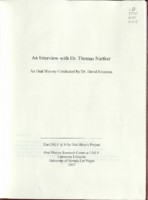
Transcript of interview with Dr. Thomas Nartker by Dr. David Emerson, November 13, 2006
Date
2006-11-13
Archival Collection
Description
Thomas Nartker was born and raised in Dayton, Ohio, and most of his family, including three brothers and a sister, still live there. He attended grade school and high school there, and then attended the University of Dayton. He majored in chemical engineering, following the example of his father, who had a degree in electrical engineering. By the time he was a sophomore in college, he was six-foot nine and had spent some time on the basketball court, but when asked to play his senior year at U. of D., he declined. He had already been accepted for graduate study at the University of Tennessee. Thomas finished all course work and research on his master's in one year, everything but the thesis. He interviewed over 30 companies before he graduated, but an interview with DuPont in Delaware made him think about the value of a PhD in his line of work. He applied and was accepted at Texas A&M. He worked with Dave Billingsley, who was the resident computer expert, and Dave showed him how to process all the data he had collected for his master's thesis on the IBM 650. Tom had found a new passion. Within a year, Tom was working as an assistant in the data processing center at Texas A&M, and was also the teaching assistant for the computer programming class. After completing his PhD, which took 6 years, Thomas began interviewing again. He accepted a position at New Mexico Institute of Mining and Technology (NMIMT) as assistant professor of mathematics and director of the computing center. He left NMIMT in 1981 and took a job with Shell Oil Company, which included 5 years as a visiting staff member at Los Alamos. In 1985 he met John Werth, who ultimately offered Tom a job at UNLV. Tom made the move to Las Vegas in July of 1985. Dr. Nartket and Dr. Taghva started the UNLV Information Science Research Institute and did experimental research on Optical Character Recognition (OCR) for the Department of Energy (DOE). They invented many metrics never seen before, including a metric called Nonstop Word Accuracy. Today UNLV is known worldwide for being the premier center for doing research in OCR technology. Thomas is in his seventies today and continues with his research and teaching because he loves it. He has enjoyed over two decades at UNLV and finds it a rewarding and intellectual place to be. He considers this university to be one of the most exciting in the country as it grows in research and service.
Text
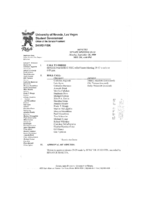
Meeting minutes for Consolidated Student Senate University of Nevada, Las Vegas, September 20, 1999
Date
1999-09-20
Archival Collection
Description
Includes meeting agenda and minutes, along with additional information about resolutions and bylaws. CSUN Session 29 Meeting Minutes and Agendas.
Text

Transcript of interview with Roy Brown by Rick Godwin, May 21, 1976
Date
1976-05-21
Archival Collection
Description
Roy Brown was born in American Fork, Utah. He relocated to Las Vegas, Nevada, in 1957. This interview is conducted by Rick Godwin at Brown’s hair salon located within Camelot Shopping Center in Las Vegas. During this interview Brown discusses his career as a hairstylist, celebrities he has styled and the growth and transformation of the haircutting industry in Las Vegas.
Text

Meeting minutes for Consolidated Student Senate University of Nevada, Las Vegas, March 21, 1991
Date
1991-03-21
Archival Collection
Description
Includes meeting agenda and minutes with additional information about senate bills.
Text
Pagination
Refine my results
Content Type
Creator or Contributor
Subject
Archival Collection
Digital Project
Resource Type
Year
Material Type
Place
Language
Records Classification

